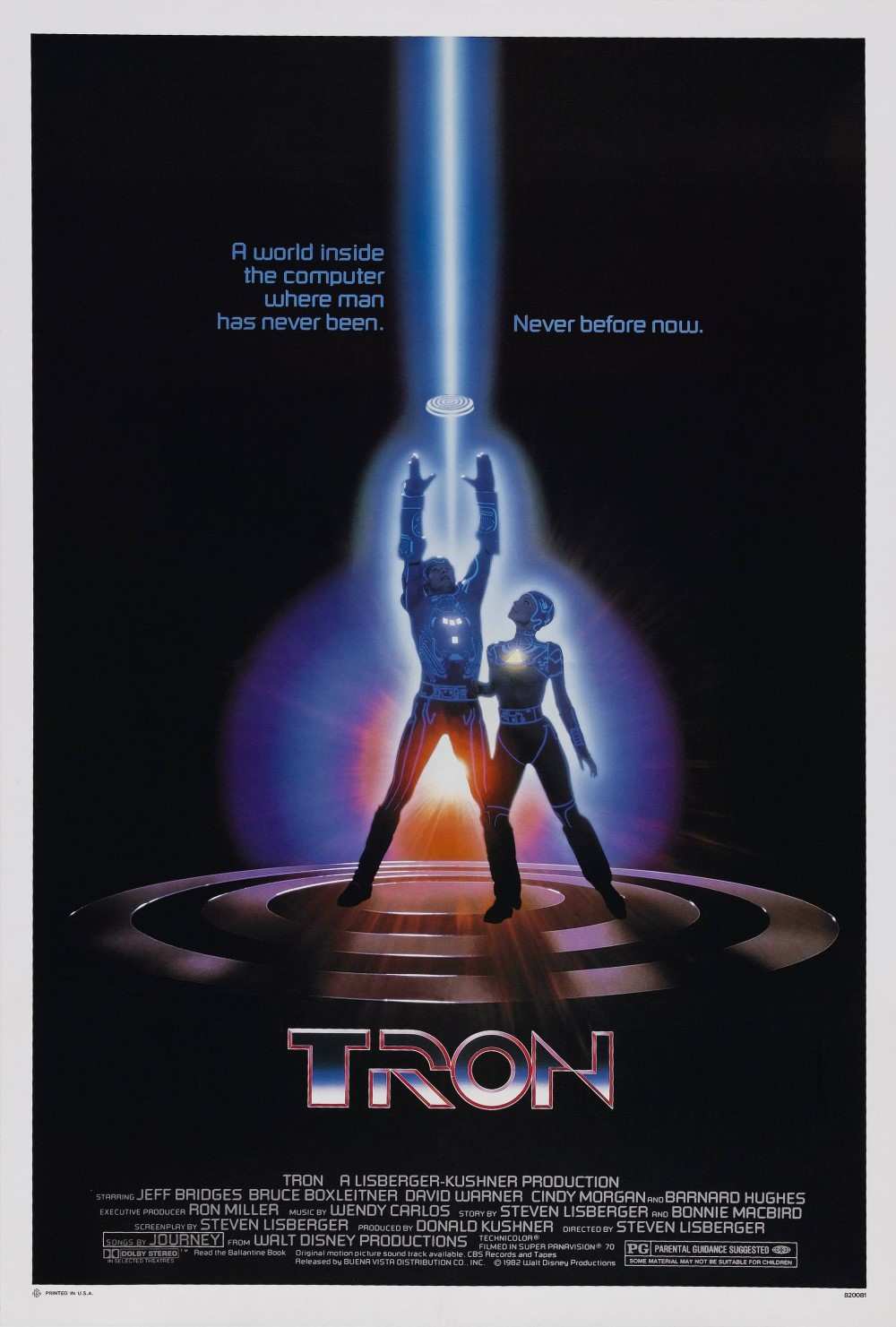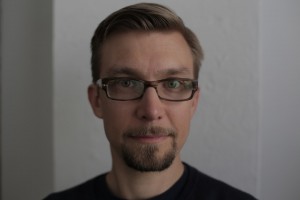
Frank Pavich is the director of the new fantastic documentary “Jodorowsky’s Dune”, which chronicles about Alejandro Jodorowsky’s never made film version of Frank Herbet’s “Dune”. He has also worked as a production manager on TV shows like “Paranormal State”. Media Mikes had a chance to chat “Dune” with Frank and find out about how he got involved with Jodorowsky and his passion for what he does.
Mike Gencarelli: How did you get involved with the documentary “Jodorowsky’s Dune”?
Frank Pavich: You just hear and read about these things like “The Top 50 Greatest Movies Never Made”. I was a fan of Jodorowsky and his movies like “Holy Mountain” and “El Topo” going back to even when you couldn’t get it except on like crazy VHS bootlegs. There was a small segment about his unfinished “Dune” in a documentary called “Jodorowsky Constellation”, but it only ran like five minutes. But during it you see his screenplay book and I thought to myself “What the hell is that book?” Once you see that book, you feel the need to just learn more and more about it. So I searched and search until one day, there was no more information out there that I hadn’t seen. So I decided to just find the guy himself and speak with him.
MG: How did you end up tracking him down and convincing him to do this?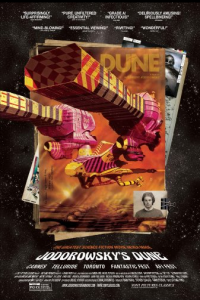
FP: I wish I could tell you what made him do it. I think the only thing I can say was from my obvious unbridled enthusiasm. I was searching for him and I found that he has an agent in Spain for acting. I didn’t even know he acted in movies other than his own but obviously he does because he has this agent. I just sent her an email and explained my situation. She took my email and just forwarded it to him. So then a couple of weeks later, I just happen to wake up to an email from Alejandro Jodorowsky. It was awesome. If I remember correctly, I didn’t even open it for like a week. I was afraid if he wrote “Dear Frank….NO!” It would have crushed my dreams. So when I opened it included was a very short message saying “I hear you are looking for me? I live in Paris and if you would like to discuss doing a project like this we would need to meet face to face”. I was like “GREAT! You don’t have to twist my arm”. I made an appointment and went to his house to discuss. I gave him the short pitch and either he just thought I was crazy or deep down that we weren’t going to finish it but he agreed to do a few interviews. So we started and went back a few times to shoot more and more interviews over time. Overall, I think it worked out really well.
MG: What I loved about this documentary is that there wasn’t like a million interviews…
FP: Oh, I hate those.
MG: Right! You had the key 10 people involved and that is all.
FP: That is what I always wanted to do. I hate those documentaries where it is only 90 minutes long and features 90 people. I can’t follow who is who and I can’t follow what is going on. Each person comes on for a half a sentence and I just get lost. I wanted to keep it to a minimum number of people. We had the greatest storyteller in the world.
MG: I agree, most importantly you kept Jodorowsky in the spotlight…
FP: Thanks for picking up on that man!
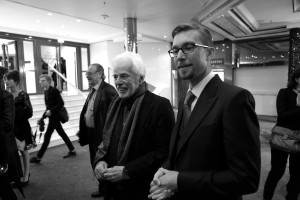
MG: What was it liked getting to review Jodorowsky’s screenplay book during your meetings?
FP: It’s funny because the first time I met him to pitch him the idea; we sat on these two chairs facing each other and in between us what this ottoman with books on it. He had actually placed THE “Dune” book on there but he never let me look at it and I didn’t ask. It was like he was teasing me with it [laughs]. It was so cruel but also hilarious. But the book was amazing. Once you get to go inside of it, you get to see that is in fact a complete film. It has every scene from the first to the very last. It also has every bit of dialogue and character details. It is something that I do not think was ever done before. It was ready to go and be filmed. What was also very interesting is that the screenplay was totally different than the book of storyboards, since it evolved over time. As he got all his “spiritual warriors”, it started to change. Just like if he would have gotten to shoot it, I am sure it would have evolved again. It is really interesting to see the process of his creativity.
MG: Tell us about the animation in the film and how was it getting to bring parts of Jodorowsky’s “Dune” come to life?
FP: We had this great animator, his name was Syd Garon. I met him through another friend and I thought that his work was perfect. He had that perfect light touch. I didn’t want to overdue the animation because it is not my vision of “Dune”, it is his vision. I just wanted to take those storyboards, which are primarily pencil on paper and breath enough life into them to elevate it off the page a little and hopefully then the viewer’s imagination will fill in the rest. It straddles the that middle ground between the storyboard and what the actual completed feature film would have been like. It was so much fun to do. We went through the book and literally got to pick out the scenes that we wanted to bring to life.
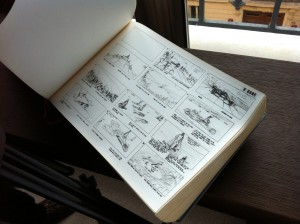
MG: What was his reaction when he saw these animated sequences?
FP: He has this philosophy when he directs his movie for everyone to leave him alone and he doesn’t want to hear from anyone since he is the artist. That is great and that is why we get the kind of movies that he makes. So I was afraid that he was going to be over my shoulder the whole time but he was definitely not a hypocrite. He believes that for himself and believed that for me as well. He let me do what I wanted and didn’t bother me at all. The first time he saw it was at the premiere at Cannes. It was a really cool experience and a really great place for him to see it. Him and his wife were next to me watching it and kept trying to peak over at them to see if they were laughing, interested or sleeping [laughs]. I could see that they were really enthralled and into it. They were also both wiping away tears at the end, which is great because you always want to make an 85 year old man cry [laughs].
MG: Having seen the film a few times now and I agree the film is quite dramatic.
FP: It is so interesting. It all comes down to his world view. This story for somebody else could be a very depressing story or it could be a winy story or angry story. “Oh, look what I didn’t get to do”. For him though, he thought it was great. He didn’t get to make the movie but he made my movie and he also had a great career and a lot of other movies were influenced by his work. Even I get choked up watching the end of the film, where he says that you have to try and that it is all about ambition. It is great. He is such an amazing and powerful guy. I am very lucky to have had a chance to work with him.
MG: Tell us about the score in the film?
FP: Our composers name is Kurt Stenzel. It is his first film and he was just great. He has never done a score before. He is this electronic musician and does all this great synthesized music. But he and I go way back actually and we grew up in Queens, New York together. I first knew of him when he was part of the New York hardcore scene. His old band was the very first New York hardcore tape that I ever bought back in 1987 or something. It is totally crazy. So he has gone from the New York hardcore world to a career scoring films. He can be like the new Mark Mothersbaugh. We are also hoping to release the score down the line for the fans.
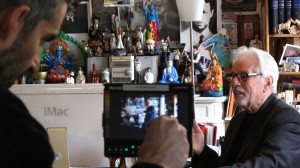
MG: How did the relationships between other films like “Raiders of the Lost Ark’s “Masters of the Universe”, “Prometheus” and others get recognized?
FP: It is weird. Some of them are obvious. When we were making the documentary “Prometheus” came out, so that was an easy one. I remember seeing the commercial and thinking “What the hell?”, since that was the Giger mountain. It was crazy. It was totally lifted from the “Dune” artwork. Then some of them we really had to search for and some we couldn’t even include. After he attempted to make “Dune”, he spoke about how he started his career in comics, he did “The Incal” and “The Metabarons” series and a bunch others. If you look at the “The Metabarons” comic, you can see images in there that ended up in the movie “The Avengers”. There was no way to put that into the movie because it would be an entirely different chapter showing how his work influenced this and that etc. But his stuff is everywhere. Even Kanye West’s last tour/album was inspired by “Holy Mountain”. So we can say that he touches everything from “The Avengers” to Kanye West. How can someone do that? So we just be searching around and looking at the storyboards and trying to see anything that resembled them. They think that there were about twenty of those books made and only two exist today. So where are the other eighteen? You see so many similarities in other films that somebody else has had to have seen this book over the years.
MG: Do you think the world will ever see Jodorowsky’s take on Dune?
FP: I think this is his take on the film. I do not think he has that burning desire to do it anymore. I think he feels that “You want to see the movie? Then it is here, watch the documentary”. I think in his mind he feels like it is done. I think he has moved on also since it has been so many years. Also can anyone make a “Dune” movie anymore? Lynch had a hard time. Syfy did a one over a decade ago. So many people have taken from the “Dune” source material, the book, which in turn has influenced so many other films. Maybe if a true representation of “Dune” came out people would think, “Oh, I have seen all this before”. They have seen in various films that maybe it wouldn’t be as exciting for them. Jodo is happy and he has no regrets. He is also very happy to have been able to tell his version of the story now in this film.
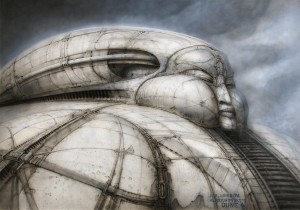
MG: What can we expect from the Blu-ray release in terms of special features?
FP: There is a ton of great material that we are passing off to our distributor, Sony Pictures Classics. I am not sure what is going to end up on the Blu-ray but I would think that they would want to include it all on there. We shot hours of interviews footage. So, we have hours and hours of interviews with Jodorowsky and all these people that couldn’t fit into the story we told. But it is still valuable stuff that I want to share with the world. If I was a betting man, I would say that it will be included on the Blu-ray release. It is too great not to have it.
MG: What do you have planned next after this film?
FP: I have a couple of ideas and projects in my head stirring around. But man, it is a challenge because this movie came out really good and I am really proud of it. It premiered at Cannes and went to Telluride and all these great film festivals. Sony Pictures Classics is releasing it. How much better can this be? What do you do to top this or complement this? That is the challenge for me. It takes so long to make these movies anyway. As far as I learned with this, if you are not totally in love with the movie you are making you are never going to finish it. Hopefully, I can find a subject that is as interesting as Alejandro Jodorowsky and his version of “Dune”. If you hear of anything left me know [laughs].
